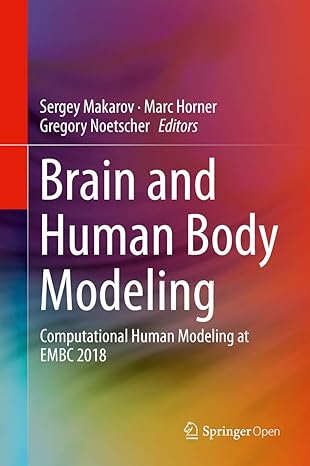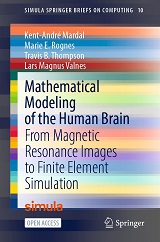
|
FreeComputerBooks.com
Links to Free Computer, Mathematics, Technical Books all over the World
|
|
- Title: Brain and Human Body Modeling: Computational Human Modeling
- Author(s) Sergey Makarov, Marc Horner, Gregory Noetscher
- Publisher: Springer; 1st ed.; eBook (Creative Commons Licensed)
- License(s): CC BY 4.0
- Paperback: 413 pages
- eBook: PDF
- Language: English
- ISBN-10: 3030212920
- ISBN-13: 978-3030212926
- Share This:

|
This open access book describes modern applications of computational human modeling with specific emphasis in the areas of neurology and neuroelectromagnetics, depression and cancer treatments, radio-frequency studies and wireless communications.
About the Authors- N/A
- Computational and Mathematical Simulations and Modeling
- Differential Equations and Dynamical Systems
- Numerical Analysis and Scientific Computing
- Applied Mathematics

- Brain and Human Body Modeling: Computational Human Modeling (Sergey Makarov, et al.)
- The Mirror Site (1) - PDF
-
 Mathematical Modeling of the Human Brain
Mathematical Modeling of the Human Brain
The book bridges common tools in medical imaging and neuroscience with the numerical solution of brain modelling PDEs, covers the basics of magnetic resonance imaging and quickly proceed to generating first FEniCS brain meshes from T1-weighted images.
-
 Modeling Neural Circuits Made Simple with Python
Modeling Neural Circuits Made Simple with Python
An accessible undergraduate textbook in Computational Neuroscience that provides an introduction to the mathematical and computational modeling of neurons and networks of neurons in Python. Build a foundation for modeling Neural Circuits.
-
 Modeling Creativity - Case Studies in Python (Tom De Smedt)
Modeling Creativity - Case Studies in Python (Tom De Smedt)
This book is to model creativity using computational approaches in Python. The aim is to construct computer models that exhibit creativity in an artistic context, that is, that are capable of generating or evaluating an artwork (visual or linguistic), etc.
-
 Modeling and Simulation in Python (Allen B. Downey)
Modeling and Simulation in Python (Allen B. Downey)
This book is an introduction to physical modeling using a computational approach with Python. You will learn how to use Python to accomplish many common scientific computing tasks: importing, exporting, and visualizing data; numerical analysis; etc.
-
 Eye, Brain, and Vision (David H. Hubel)
Eye, Brain, and Vision (David H. Hubel)
This book brings you to the edge of current knowledge about vision, and explores the tasks scientists face in deciphering the many remaining mysteries of vision and the workings of the human brain.
-
 Brain, Vision and AI (Cesare Rossi)
Brain, Vision and AI (Cesare Rossi)
The aim of this book is to provide new ideas, original results and practical experiences regarding service robotics. This book provides only a small example of this research activity, but it covers a great deal of what has been done in the field recently.
-
 From Bricks to Brains: Embodied Cognitive Science of LEGO Robots
From Bricks to Brains: Embodied Cognitive Science of LEGO Robots
This book introduces embodied cognitive science and illustrates its foundational ideas through the construction and observation of LEGO Mindstorms robots - even simple agents, such as LEGO robots, are capable of exhibiting complex behavior.
-
 Train Your Brain: Build a Framework for Clear Thinking
Train Your Brain: Build a Framework for Clear Thinking
This book will help you build a mental framework for clear thinking. With daily practice you can build your skills in clear thinking, and become a more productive and happier person. The basic anatomy of the brain is presented.
-
 Numerical Simulations of Physical and Engineering Processes
Numerical Simulations of Physical and Engineering Processes
The book handles the numerical simulations of physical and engineering systems. It can be treated as a bridge linking various numerical approaches of two closely inter-related branches of science, i.e. physics and engineering.
-
 Solving PDEs in Python: The FEniCS Tutorial I (H. Langtangen)
Solving PDEs in Python: The FEniCS Tutorial I (H. Langtangen)
This book offers a concise and gentle introduction to finite element programming in Python based on the popular FEniCS software library. Using a series of examples, it guides readers through the essential steps to quickly solving a PDE in FEniCS.
-
 Scaling of Differential Equationsn (Hans Langtangen, et al.)
Scaling of Differential Equationsn (Hans Langtangen, et al.)
Scaling is a classical topic in applied mathematics, but here strongly connected to numerical simulations. The book contains a wide range of examples, of differing complexity, from many different scientific fields.





